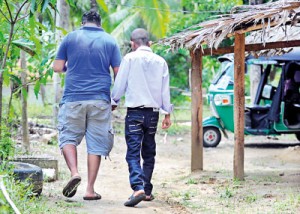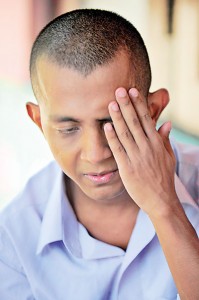Stumbling in the dark for 20 years

Guiding friend: Supun (on the left) with Ashoka. Pix by Amila Gamage
He can smell the flowers but he cannot see the vibrant hues of pink and red of the roses, zeeniyas and ixora in his garden.
For, diminutive Wathukarage Ashoka Thilakeratne, just 31 years is blind.
He has not been blind from birth, but the cruel hand of fate had rendered him a hard blow when he was still a boy of 11.
We have travelled through lush green landscapes but on roads good and mostly bad, bumpy and rutty, to Ashoka’s home. Far away from Pallebedda town off the Embilipitiya-Ratnapura Road, we have been shown the way by Ashoka’s childhood and constant friend, Supun Udara who drives a trishaw, turning off at Ambewala to end our journey in remote Pussethota, while wondering how Ashoka would be accessing medical care from here.
The terrible and unexpected life-changer for Ashoka came when as a carefree boy he was walking home after school and was struck by a speeding motorcycle. ‚ÄúMaava wisi wuna,‚ÄĚ he says, adding that he was thrown off his feet and landed on a nearby rock, smashing the left side of his head. There was heavy bleeding, three stitches and darkness descending on his little world gradually, leaving him blind.
Numerous visits to the National Hospital and the Eye Hospital in Colombo for him and his humble farming family ended with the same gloomy prediction ‚Äď ‚Äúsnaau sawuththu wela, honda karanna be.‚ÄĚ (The nerves were damaged and his blindness could not be cured.)
Chaayavak penawa, says Ashoka, explaining that he can see shadows through his left eye and that’s why he consulted Neurosurgeon Dr. Deepal Attanayake last year in January, who gave him a prescription and advised him to take those at least for a year to see whether there would be a change in his condition. Ashoka is still in search of a little money to buy what has been prescribed.
Ashoka lives with an older ‚Äúabaditha‚ÄĚ (disabled) sister who is both deaf and dumb from birth and his elderly father, Alon Singho, who has a tiny mada idama (kumbura) which keeps them supplied with rice and a few vegetables for their daily frugal meals.
Last year, this family lost the very foundation on which it was built, Ashoka’s mother, Jusi Nona, who saw to all the work and since then, Ashoka says that Thaththa has become a little mentally unstable.
As we chat in their tiny home, bare-chested Thaththa who has been iratu seeranawa (cleaning ekels) walks in and keeps shedding a tear for his Jusi Nona and showing us their wedding photograph. Very loud are his lamentations, as he is also deaf.
Even though impoverished, they are welcoming and hospitable. In expectation of our visit, Ashoka has gone all the way to Pallebedda with his friend Supun to buy a fruit cake, huge pieces of which are offered to us along with bananas and steaming cups of sweet kahata (plain tea).
Although we were due in their home in the morning, a delay on the road has caused us to be there by noon on a Thursday and they are dismayed that they are not able to offer whatever meagre lunch they would be having.

Ashoka: In a world of darkness
Ashoka as a boy and later as a youth has not been idle ‚Äď he had attempted to study Braille but says with regret that having been able to see earlier made it difficult for him to engage in this new way of assimilating knowledge.
Thereafter, he had also undergone vocational training, learning how to make kosu-idal (brooms and ekel-brooms) but the competition from bigger manufacturers had put paid to his attempts to earn a livelihood.
Wherever he goes, Ashoka has to be guided and it is his faithful friend Supun who does that. He gets a disability allowance of
Rs. 3,000 per month from the Department of Social Services and scrupulously takes only a little bit of it, making it stretch as much as possible, using his thumb-print at the bank to withdraw money as he cannot see to sign his name.
As we take our leave, he insists on coming to our vehicle parked a distance away, holding onto Supun‚Äôs shoulder to ‚Äėsee‚Äô us off with unseeing eyes.
Ashoka also calls us frequently to make sure that we have reached Colombo and our homes safely.
| A plea for help¬† ‚ÄúHelp me,‚ÄĚ pleads blind Ashoka, appealing to all those kind people out there to send whatever they can so that he can buy what has been prescribed by Consultant Neurosurgeon Dr. Deepal Attanayake in a final bid to see whether he will be able to regain his sight. A wish very close to Ashoka‚Äôs heart is to set up a small boutique in his garden, along with someone trustworthy, to sell sillara badu (dry rations) to the villagers. ‚ÄúThis self-employment will make me independent providing me a livelihood,‚ÄĚ he says, looking sightlessly into the future. His father is 73 years old and the thought of who will fend for him and his sister as they age, is causing much anxiety for Ashoka who says that if only his sister had a sewing machine she would be able to stitch pieces of clothing and sell them in the village. All those wishing to give a helping hand, may send whatever they can spare to Account No. 245 2001 2005 60 34 at the People‚Äôs Bank, Godakawala branch in the name of W.A. Thilakeratne. Personable Ashoka is contactable on Mobiles: 0711747130 or 0775574253. His postal address is: W. Ashoka Thilakeratne, C/o Danapala Stores, Pussetota, Pallebedda. |


